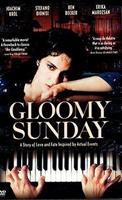 BUY IT AT AMAZON: CLICK HERE!
BUY IT AT AMAZON: CLICK HERE!
STUDIO: Warner Bros. Home Video
MSRP: $19.98
RATED: NR
RUNNING TIME: 114 Minutes
SPECIAL FEATURES:
• None
The Pitch
"It’s
The
Pianist meets The Dreamers!"
The Humans
Erkia Maroszan, Stefano Dionisi, Joachim Krol
The Nutshell
Imagine,
if you will,
the restaurant Szabo with his young lover Ilona. But what is a restaurant
without a piano and musician? Laszlo and Ilona employ a young man named Andras
to tickle the ivories. The longer Andras works at Szabo, though, the more he
falls in love with the lovely and vibrant Ilona. As the world spirals into war,
and relationships tumble and break, Andras writes the titular song, a melody that sums up all the breaking hearts
in a plenty fractured world.
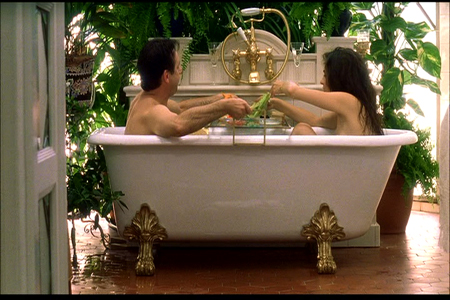
Eve’s lost her lettuce.
The Lowdown
Dear
Penthouse,
You know
how when you find something that you really love you want to share it with
everyone you know? A movie, or a bend in the river; a piece of music or a sudden
insight. They say that misery loves company, but I think that joy likes a good
party. At first, anyway. Then there’s that jealousy which creeps in, like the
suspicions of a monogamist. I heard the band first; I love them better. I saw
that movie way before CHUD thought it was cool.
Even when
united in appreciation, and love, we humans can’t help but be in contention.
That is the soul of Gloomy Sunday and its soft, sexy character play. The obvious
analogy to the odd pains of unity is the love triangle. In Bernardo
Bertolucci’s The Dreamers, the relationships caught and reflected the
vibrant desperation of youth; in Gloomy Sunday, a similar sort of
sexual dynamic represents a broader field — involving countries set in
conflict, as well as the unproven mysteries of certain souls — but is no less
intimate for it. And in place of Bertolucci’s paean to cinema, Gloomy
Sunday gives over its central power to the melody of the titular song.
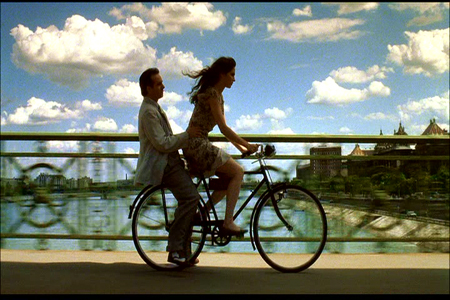
"500 bonus points if you hit de Sica."
There is
a sweetness to the film’s opening act, despite the promise of a bitter
aftertaste. Against the backdrop of Holocaust divisiveness, our protagonists
are united first in place — the primary location being the restaurant Szabo —
then in appreciation of the melody, and then in love. With all the space taken
up by the nuances of Ilona’s relationship with the two men in her life, as well
as Laszlo’s friendship and mentorship of Andras, there is absolutely no room
for black and white in the story. The characters are uncommonly open with their
affections and dissatisfactions with one another, but rather than having those
emotions dictate their interactions, they instead form a rolling boil under the
surface tension exhibited by each character’s distinctiveness. When the tension
breaks, the mixture scalds.
It’s a
supremely sad realization that Gloomy Sunday hangs upon: humans can
not help but form rivalries, bitter or somber or slow. What begins as a sweet
statement on how the commonalities of individuals can create an environment of
humanity even in the midst of the coldest fractures travels through a land of
regret and realism — the sort that the less thoughtful might term cynicism.
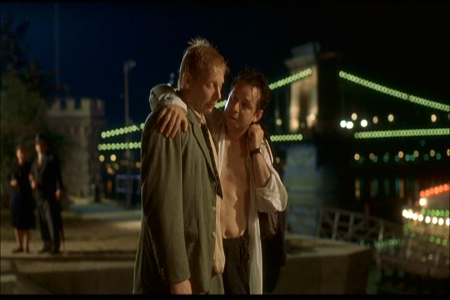
"Wir sind poor little sheep who have lost unser Fuhrer…"
Though
that is the core engine of the story, it would be wrong of me to leave you with
the impression that such a depressing conclusion is what you will remember
about the film. There is another layer beneath that, a prime-mover for the
awkward unity that anchors the film: the beauty of expression. Andras’
composition and the physical love shared by the characters become somewhat
analogous, placing the sexual release on equal footing (and requiring equal
responsibility) as the performance of "Gloomy Sunday," a fact which
becomes more potent when a subplot regarding a number of suicides committed
with the song as their soundtrack develops. By accomplishing similar story
elements, sex and music become confused in an effect that’s easily more erotic
than anything else I’ve seen this year.
They say
that every story is about sex, death, and God; but Gloomy Sunday stands as a
much more potent combination of topics. It’s about sex, yes, and death, but God
is absent. He has been replaced, and rightly so, by people: flawed, lonely,
necessary human beings. It’s a comprehensive set of expressions of all types,
forming a film that seems uncannily complete.
It says something true, and does so with grace and subtlety.
Sincerely,
Speechless
in
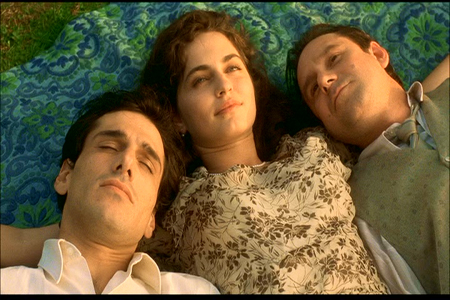
The Package
No
bonuses, but the audio and video are both worthy of note. The cinematography,
full of golds and rich browns, recalls The Godfather, and the soundtrack,
with its varied landscape of musical expressions, is just stellar.
8.7 out of 10